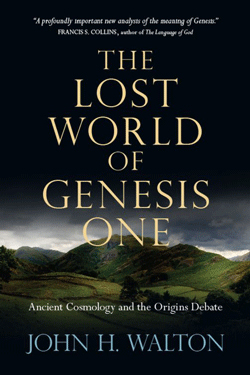 The Lost World of Genesis One: Ancient Cosmology and the Origins Debate- John H. Walton
The Lost World of Genesis One: Ancient Cosmology and the Origins Debate- John H. Walton
The last 6 years of my life I have been focused on studying history, Christianity, and science, always with an eye to looking at the serious questions of cosmology, anthropogeny and the origins of civilization. In relation to cosmology, I have found no single book more profound and articulate in explaining the Genesis account of creation than John H. Walton's "The Lost World of Genesis One: Ancient Cosmology and the Origins Debate".
There is a torrid spew of rhetoric accompanying both Christian and non-Christian views on the creation narrative found in Genesis 1. There are as many factions of Christian creationism as there are scientific theory groups whose anti-theist positions demand just as polemic a view point. What normally happens when Christian talk about cosmology (origins) is that they come down into two groups: those who believe the Genesis 1 account is literally true; and those that believe the Genesis creation narrative is allegorical. There are a few other subtler positions that combine features of the two, as well.
What Walton does with "The Lost World of Genesis One" is to revisit the text, the language, the culture and the ancient literature in which the text finds its context, and brings to us a brilliant re-thinking of the entire debate. Part of the problem with this intensely powerful topic is that the conversation around it has become almost political in its consumption of subtly. We take sides without thinking deeper about the topic. But most of that is hardly our fault. Genesis is written thousands of years ago, into a language and culture we don't know or understand. Walton walks us into that strange world, and expertly explores how the ancient text was written, for whom it was written and how it can be read today in a startlingly satisfying and understandable way.
Because of the intensity and applicability of the topic (especially in today's culture and media) and the landmark approach which Walton synthesizes in this book, this is easily the most important book you read will this year, possibly in the next several. In the Western world we often believe that the most important questions can be answered by short, simple sound bites. But this leaves us with a truncated mental grid through which to explore complex and profound truths. John Walton takes a lifetime of research and teaching to present a clear understanding of Genesis 1 that doesn't reduce the complex and important details into creationist or evolutionary memes.
One of the pivotal points made by Walton is that the Genesis narrative, rightly understood, holds together as real and actual creation, but in a way that compliments the setting into which it was written. He says :
In a functional ontology, to bring something into existence would require giving it a function or a role in an ordered system, rather than giving it material properties. Consequently, something could be manufactured physically but still not "exist" if it has not become functional.1
The implications of this statement are vetted out through 18 propositional chapters, along with a summary and much more supporting information which even includes a "Q&A" section to explore the nuances of what such a position means to Christians and the world. I won't give more details here, since this is a serious book that really states every point well. In my opinion, this is the most important book of the decade.
I implore you- if you read just one book this year, make it this book. This excellent book contains the single best explanation for cosmology and the Genesis narrative I have ever heard. It is because of this that "The Lost World of Genesis One" garners our Editor's Choice Award. I can't urge you enough to consider this profound work. John H. Walton has given the Christian church a brilliant, readable and (most importantly) usable thesis for one of humanities most profound inquiries- the question of Creation.
Amazon Link: http://amzn.to/1TxqkPr
Review by Kim Gentes
- Walton, John H. The Lost World of Genesis One: Ancient Cosmology and the Origins Debate (Downers Grove, IL: InterVarsity Press, 2010) Pg. 26. Kindle Edition.